As we watch the summer fade into the background, back to school season has rushed in to take its place. Get in the academic spirit by diving into some of the best back to school movies!

From iconic classics to modern masterpieces, these great back to school movies are not only entertaining but also empowering! They offer valuable life lessons to help you navigate the academic landscape and ease the transition to student life. Whether you’re a new student looking for cinematic inspiration, or simply seeking a nostalgic trip down memory lane, this article has 20 great back to school movies that will leave you empowered and inspired!
1. RUSHMORE (1998)
Rushmore (1998) is a great choice to get you in the mood to go back to school, especially if you’re a Wes Anderson fan! This gem captures the high school experience with quirky humor and heartfelt moments that resonate with students of all ages. At its core, the film explores the ups and downs of adolescence, the awkwardness of first crushes, and the pursuit of one’s passions, all set against the backdrop of a prestigious prep school.
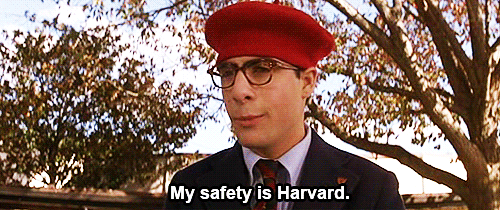
Jason Schwartzman’s character, Max Fischer, embodies the determination and enthusiasm that can inspire anyone to approach a new school year with determination. With its unique visual style and relatable themes, Rushmore reminds us that school is not just about learning but also about forging friendships, and embracing adventure.
2. LADY BIRD (2017)
Lady Bird (2017) is a must-watch film as you gear up for a new academic year. Greta Gerwig’s masterful storytelling and Saoirse Ronan’s exceptional performance combine to create an authentic and relatable coming-of-age tale. Set against the backdrop of a Catholic high school in Sacramento, the film brilliantly captures the rollercoaster of emotions that come with the final year of high school.

It beautifully explores themes of self-discovery, the complexities of mother-daughter relationships, and the universal desire for independence. Lady Bird‘s journey resonates with anyone who has ever felt the push and pull of leaving home for new horizons.
3. TOY STORY 3 (2010)
Toy Story 3 (2010) might not be a traditional back-to-school film, but it’s an absolute gem to watch when gearing up for a new academic year. This beloved Pixar masterpiece appeals to audiences of all ages with its heartwarming and relatable storytelling. As Andy prepares to leave for college, the toys themselves face a transition that mirrors the bittersweet emotions many students experience when leaving home.

The film’s exploration of friendship, loyalty, and embracing change is both touching and inspiring. Plus, the colorful and imaginative world of toys reminds us of the sense of wonder and creativity that can make learning so exciting. Toy Story 3 teaches us that while growing up and going back to school may be filled with uncertainty, it’s also an opportunity for adventure and new beginnings. This makes Toy Story 3 an ideal movie to set the mood for the new school year ahead!
4. THE BREAKFAST CLUB (1985)
The Breakfast Club (1984) remains a timeless classic for anyone looking to get into the back-to-school spirit. John Hughes’ iconic film brings together a diverse group of high school students, each representing a different social clique, and places them in Saturday detention. As they spend the day together, they break down barriers and form unexpected bonds.

This film beautifully captures the complexities of teenage life, highlighting the struggles of identity, peer pressure, and the desire to be understood. Watching these characters evolve from stereotypes into genuine individuals serves as a powerful reminder that everyone has their own unique story to tell.
5. DEAD POETS SOCIETY (1989)
Dead Poets Society (1989) is an inspirational and thought-provoking film that serves as a perfect prelude to the school year ahead. Set in an all-boys preparatory school, the movie is a poignant exploration of the transformative power of education and the importance of thinking for oneself. The great Robin Williams delivers a remarkable performance as John Keating, an English teacher who encourages his students to seize the day and embrace the art of poetry.

This film not only celebrates the joy of learning but also underscores the significance of challenging conventions, pursuing one’s passions, and finding your unique voice. As we prepare to head back to campus, Dead Poets Society reminds us to approach our studies with curiosity, creativity, and a sense of purpose.
6. EIGHTH GRADE (2018)
When it comes to the beautiful awkwardness of being a teenager, Bo Burnham’s Eighth Grade (2018) offers an honest and relatable portrayal of the challenges faced by adolescents on the cusp of high school. Burnham masterfully captures the anxieties, insecurities, and hopes that come with the transition to a new academic environment. Through the lens of its protagonist, Kayla, the film navigates themes of self-identity, social media pressures, and the quest for acceptance.
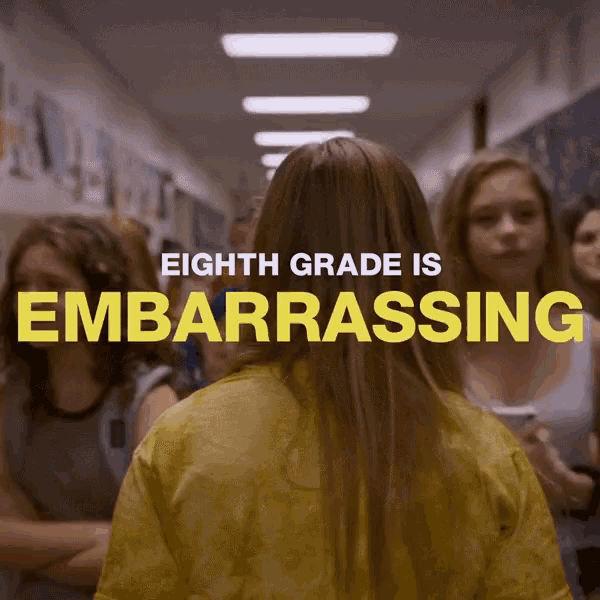
Watching Kayla’s journey to find her voice and forge meaningful connections serves as a poignant reminder that every new school year is an opportunity for growth, self-discovery, and the chance to overcome our fears.
7. CENTER STAGE (2000)
Center Stage (2000) is a delightful choice for those seeking motivation as they head back to school. This film throws viewers into the competitive and demanding world of ballet, where aspiring dancers at a prestigious academy strive to achieve their dreams.

As they navigate rigorous training, personal challenges, and the pursuit of excellence, the characters in Center Stage express qualities such as dedication, perseverance, and passion that can be applied to any academic pursuit! Moreover, the film’s themes of friendship, self-discovery, and the pursuit of one’s true passion resonate with students at any stage of their educational journey. The film encourages us to pursue our goals with unwavering determination and reminds us that success often requires pushing our boundaries and embracing our unique talents.
8. AKEELAH AND THE BEE (2006)
Akeelah and the Bee (2006) is a great academic-themed film to watch because it celebrates the power of education, determination, and the pursuit of one’s dreams. This heartwarming film tells the story of Akeelah, a young girl with a remarkable talent for spelling, who aspires to compete in the National Spelling Bee.

The movie underscores the importance of hard work, resilience, and the support of mentors and peers in achieving academic goals. It encourages you to embrace your unique talents and believe in your potential as you face the challenges and opportunities of the new school year with confidence and enthusiasm!
9. FRIDAY NIGHT LIGHTS (2004)
Friday Night Lights (2004) is a great choice to get you into the school spirit, even if it primarily revolves around the world of high school football. This powerful sports drama not only captures the electrifying atmosphere of Friday night football games but also delves deep into the lives of the players, their families, and the community that rallies behind them.
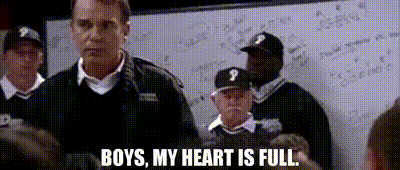
As these athletes strive for excellence on the field, the film underscores the importance of teamwork, perseverance, and the pursuit of one’s dreams. Moreover, it showcases the pressures and expectations faced by high school students, highlighting their resilience and the mentorship they receive from dedicated educators and coaches.
10. MONSTER UNIVERSITY (2013)
Monsters University (2013) takes you on a hilarious and heartwarming journey through the world of higher education, albeit in a slightly unconventional setting. This animated gem provides a delightful blend of comedy, friendship, and life lessons that resonate with students of all ages!

The film follows the endearing characters Mike and Sulley as they embark on their collegiate adventure at Monsters University. This feel-good film illustrates that success in school is not solely determined by one’s initial expectations but often by the lessons learned and the friendships forged along the way. Its vibrant and imaginative world is a delightful reminder that the school experience can be full of surprises, personal growth, and, most importantly, fun. Watching this film is sure to infuse you with the joyful school spirit, motivating you to make the most of your own educational journey.
11. BOOKSMART (2019)
Booksmart (2019) is a perfect film to watch as you begin your new academic year as it brilliantly encapsulates the essence of youth, friendship, and the transformative power of education! Olivia Wilde’s directorial debut is a refreshing take on the traditional coming-of-age narrative, following two high-achieving friends who decide to let loose and experience the teenage rites of passage they’ve missed.

This film celebrates the importance of balancing hard work with making meaningful connections and having fun. It’s a reminder that while academic pursuits are essential, so too are the relationships and experiences that shape our growth during our school years.
12. 10 THINGS I HATE ABOUT YOU (1999)
A beloved high-school classic for many of our younger generations, full of witty banter, the fight for popularity & high school love! This modern adaptation of Shakespeare’s “The Taming of the Shrew” is set in a high school and revolves around the complexities of teenage relationships and identity.
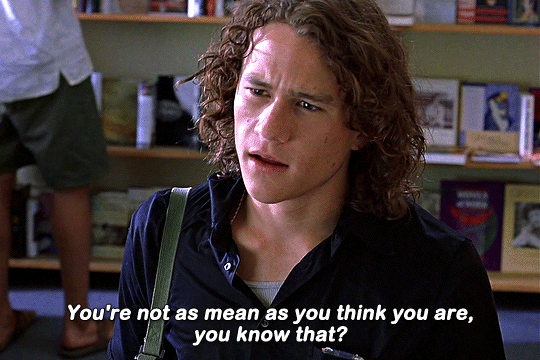
10 Things I Hate About You emphasizes the importance of authenticity and the courage to be oneself while navigating the social dynamics of high school. It’s a reminder that school is not just about academics but also a place where friendships blossom, and valuable life experiences are gained.
13. SING STREET (2016)
Set in the 1980s in Dublin, Sing Street (2016) is a musical that follows a group of teenagers who form a band as a means of self-expression and escape from their daily struggles. The film beautifully captures the power of music and creativity in the face of adversity. Sing Street encourages viewers to pursue their passions, forge their unique paths, and find their voices, even in the midst of academic challenges.
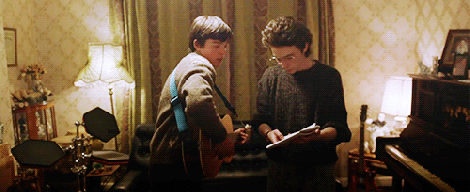
It’s a heartfelt reminder that school is not just about textbooks and exams; it’s a place to also discover your identity and explore your talents. With its infectious soundtrack and heartwarming storyline, this film will leave you inspired, ready to face the school year with confidence, and eager to embrace the opportunities for self-discovery and growth that lie ahead!
14. LEGALLY BLONDE (2001)
Legally Blonde (2001) is a great movie to watch as you embark on a new academic year because of it’s powerful message about resilience. The film follows the journey of Elle Woods, a seemingly stereotypical sorority girl, who defies expectations by enrolling in Harvard Law School to win back her ex-boyfriend. Along the way, she discovers her true potential and the power of determination, proving that you can overcome any obstacle when you believe in yourself!

Legally Blonde is a reminder that success in academia, or any field, isn’t limited by appearances or preconceived notions. It encourages viewers to embrace their individuality, work hard, and persevere in the face of challenges, ultimately showing that with dedication and self-confidence, you can achieve your goals and excel in your academic pursuits.
15. LARRY CROWNE (2011)
Larry Crowne (2011) is a film that offers valuable lessons and a sense of optimism, making it an excellent choice as you kickstart your new academic year. Tom Hanks, who also directed the movie, plays the titular character, Larry Crowne, who returns to college to reinvent himself after losing his job. The film beautifully illustrates the idea that it’s never too late to pursue education and personal growth. It encourages viewers to embrace change, step out of their comfort zones, and seize new opportunities.

Through Larry’s journey of self-discovery and the friendships he forms with his diverse classmates, Larry Crowne reinforces the notion that education is a lifelong journey filled with the potential for self-improvement and meaningful connections.
16. INSIDE OUT (2015)
Inside Out (2015) is a beloved film, providing valuable insights into the emotional rollercoaster that often accompanies major life transitions, including starting a new school year. This animated masterpiece takes viewers on a journey inside the mind of a young girl named Riley, personifying her emotions as colorful characters. It teaches us that it’s okay to feel our emotions including fear, sadness, and joy. Especially when facing new challenges like a new academic year!
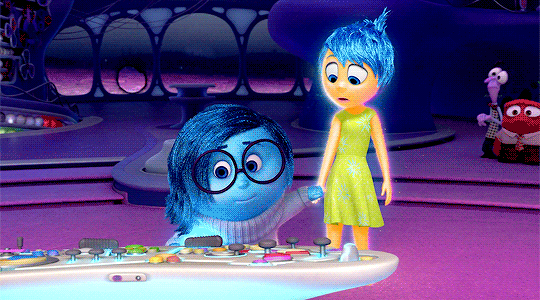
The film encourages self-awareness and empathy, reminding us that everyone, even our teachers and classmates, has their own inner emotional world. Inside Out underscores the importance of understanding and managing our emotions, which can be particularly helpful when dealing with the ups and downs of academic life.
17. CLUELESS (1995)
Clueless (1995) is an iconic and timeless film that offers a fun and stylish way to get into the back-to-school spirit. Set in a high school in Beverly Hills, this modern adaptation of Jane Austen’s “Emma” follows the life of Cher Horowitz, a fashionable and popular teenager who decides to play matchmaker.

While it may seem like a lighthearted teen comedy, Clueless carries valuable messages about friendship, self-discovery, and the importance of kindness and empathy. Cher’s journey from a seemingly shallow teenager to someone who genuinely cares about others serves as an inspiring reminder that personal growth is a significant part of the school experience. This film is not only entertaining but also a fun way to start your new school year with a positive attitude!
18. REMEMBER THE TITANS (2000)
Remember the Titans (2000) is a sports drama is based on the true story of a high school football team in Alexandria, Virginia, as they navigate racial integration and cultural differences in the early 1970s. The film highlights the power of teamwork, leadership, and the ability to bridge divides through shared goals and understanding.
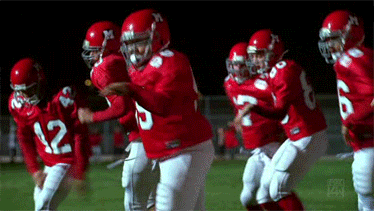
As you start your new academic year, Remember the Titans reminds you that unity, respect, and embracing diversity are essential values that can lead to success both on and off the field. It’s a heartwarming story that encourages you to face challenges with determination, empathy, and a commitment to making your school community a better place for everyone.
19. FAME (1980)
This musical drama takes you into the vibrant and competitive world of students at the High School of Performing Arts in New York City. It celebrates the dedication, talent, and resilience required to excel in the arts while navigating the challenges of school life.

Fame is a testament to the idea that with hard work, perseverance, and a supportive network, you can achieve your goals. It’s an inspiring reminder to embrace your unique talents, pursue your passions, and strive for excellence in your academic and artistic endeavors!
20. MEAN GIRLS (2004)
Last but certainly not least, Mean Girls (2004) is a brilliant choice to watch as you embark on a new school year because it provides both humor and valuable life lessons about the complexities of social dynamics in high school. This witty and satirical comedy takes a humorous approach to addressing issues such as bullying, peer pressure, and the search for identity.
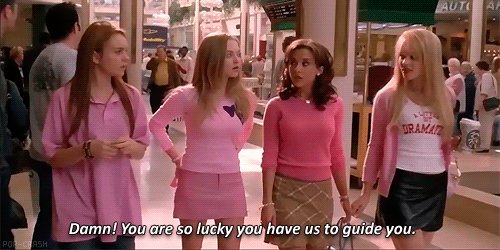
Through the eyes of the protagonist, Cady Heron, it highlights the importance of staying true to oneself. The film serves as a reminder that while high school can be a challenging environment, it’s also an opportunity to learn valuable lessons about kindness, empathy, and the importance of community. Mean Girls will entertain you while offering insights that can help you navigate the ups and downs of the school year with grace and integrity.
Related Articles
Film Production (Diploma) – InFocus Film School
Is Film School Worth It? Should I Go To Film School?
InFocus Film School 2022: A Year In Review
5 Tips On How To Choose The Best Film School
How To Pick The Best Screenwriting School
TALK TO A PROGRAM ADVISOR
By submitting this form you are agreeing to be contacted by InFocus Film School. We will never sell or distribute your information, and you may opt-out of receiving emails from us at any time. Read our Privacy Policy here.

The 96th Oscars: Free Printable Ballot!
How to Become a Movie Director – Unlocking the Director’s Vision with David Michan
To uncover the secrets of this captivating realm, we need to look no further than the dynamic and visionary director, David Michan. Renowned for his groundbreaking work not only in film but also in television, Michan stands as a beacon of inspiration for aspiring directors worldwide. As the lead film instructor at InFocus Film School, his insights are more than just guidance; they are a thrilling expedition through the intricate pathways of cinematic excellence. His upcoming film, “The Girl in the Polaroid,” was shot entirely with a crew of InFocus alumni, including co-director Ed Alexander. With Michan at the helm, the journey to becoming a director becomes an exhilarating adventure, full of twists, turns, and unforgettable moments of creative brilliance.
What is a Director?
“A director is an artist, a problem solver, and a visionary,” asserts Michan. In his view, the role transcends mere technical proficiency, encompassing a profound ability to create, innovate, and inspire. It’s about harnessing intuition and forging a unique perspective that sets one apart in a sea of storytellers. Michan’s definition underscores the multifaceted nature of directing—a delicate balance of creativity, pragmatism, and leadership.
According to Michan, a director must possess a comprehensive understanding of various disciplines, ranging from history and cinema to photography and acting. “To have your own vision, you need to delve deep into diverse subjects,” he advises. This broad knowledge base serves as the bedrock upon which directors can craft narratives that resonate with authenticity and depth. It’s not merely about mastering technical skills but also about cultivating a rich tapestry of influences that shape one’s artistic sensibilities.
Directors Embrace Learning
Michan’s philosophy emphasizes the importance of continuous learning—an ethos that he instills in his students. “As a director, you must always be learning something new,” he emphasizes. This commitment to growth ensures that directors remain adaptable in an ever-evolving industry, where trends and technologies are in constant flux.
“Even seemingly unrelated subjects can offer valuable insights,” Michan observes. He encourages aspiring directors to explore diverse interests, drawing connections between disparate disciplines. Whether it’s delving into the history of cinema or studying the intricacies of graphic novels, every piece of knowledge contributes to a director’s creative arsenal. It’s about cultivating a curious mind—an insatiable hunger for knowledge that fuels innovation and ingenuity.
Directors Start Simple and Dream Big
For novice directors eager to make their mark, Michan offers pragmatic advice: start small. “Keep it simple, keep it realistic, keep it within your budget,” he advises. Beginning with modest projects allows filmmakers to hone their craft without succumbing to the pressures of grandiosity. It’s a gradual ascent—a series of small victories that build confidence and competence over time.
“Too often, aspiring directors try to leap from crawling to running,” Michan observes. This impatience can lead to frustration and disillusionment when lofty ambitions collide with practical constraints. By embracing simplicity, directors can focus on mastering fundamental techniques before embarking on more ambitious endeavors.
Directors Must Be Expert Communicators
Central to the director’s toolkit is the ability to communicate effectively with actors. “Actors are not performers; they’re artists living the role,” Michan asserts. To elicit authentic performances, directors must provide clear, concise direction that resonates with the cast.
“Clarity is key,” Michan emphasizes. Directors should eschew pretentiousness in favor of straightforwardness, ensuring that actors understand their motivations and objectives. This transparent approach fosters trust and collaboration on set, allowing performers to fully immerse themselves in their characters.
“Directing is not about being snobby or cryptic,” Michan cautions. Instead, it’s about fostering an open dialogue that empowers actors to explore and inhabit their roles with confidence. By cultivating a supportive environment, directors can coax out nuanced performances that elevate the narrative.
Directors Must Have A Passion for Cinema
At the heart of Michan’s philosophy lies a profound love for cinema—a passion that fuels his creative endeavors. “Cinema is my motivation,” he confesses. For Michan, filmmaking is more than a profession; it’s a means of self-expression—a conduit for channeling emotions, ideas, and aspirations onto the silver screen.
“Cinema has the power to entertain, to provoke, and to inspire,” Michan reflects. Whether through heart-pounding action sequences or poignant character studies, film has the ability to evoke a myriad of emotions and leave a lasting impact on audiences.
“Think about something that makes you truly happy,” Michan urges. “That’s cinema.” For him, the joy of filmmaking lies in the ability to connect with audiences on a visceral level—to elicit laughter, tears, and everything in between. It’s a symbiotic relationship—a shared experience that transcends language and culture.
Navigating the Director’s Journey
In the vast landscape of filmmaking, the path to becoming a director is as diverse as the stories they tell. Through the lens of David Michan’s insights, we glean a deeper understanding of the artistry, discipline, and passion that define this noble pursuit.
From embracing lifelong learning to fostering clear communication with actors, Michan’s teachings offer a roadmap for aspiring directors to follow. It’s a journey fraught with challenges and triumphs, setbacks and breakthroughs. But through dedication, perseverance, and a steadfast commitment to their craft, aspiring directors can unlock the boundless potential within and bring their cinematic visions to life.
InFocus Film School Wrapped 2023
With the new year coming up, we’re recapping our student successes during 2023. From the bustling classrooms to the bustling film industry, our alumni have not just embraced the art of filmmaking; they have elevated it to new heights. So, grab your virtual popcorn and join us on this thrilling journey through the alumni success stories that bring pride to our film school and inspire the next generation of storytellers to dream big, aim high, and shoot for the stars.
FILM FESTIVALS
High End Dying
2023 | Directed by Helen Liu
Official Selection of Crazy8s
When elite-level chef Eloise Vaughn receives a scathing review from famed critic Alistair Brown, she invites him back for a private dinner service aimed at redeeming her name. Alistair accepts, and as the service commences, the pair’s shared history is revealed, as are the extreme lengths Eloise is willing to go to impress him.
2022| Directed by Janalee Budge
Official Selection of CBC Short Film Face Off 2023 | Best International Film at Huntington Beach Cultural Film Festival
Upon discovering that her Great Grandma Lee’s dress still contains her spirit for anyone who dons it, Selena decides to use it to help repair broken family relations.
FILM PRODUCTION
In the dynamic world of film production, success stories often unfold as tales of passion, perseverance, and talent coming to fruition. Our esteemed film production program boasts an impressive roster of alumni who have transcended the confines of academia to make their mark in the industry.
Janice Mingas
Walt Disney Animation Studios | Production Coordinator
Helen Liu
Blood in the Snow Film Festival | Director of High End Dying
Paradox Delilah
Blood in the Snow Film Festival | Creator of Twig and Twine
Garima Soni
Telus Storyhive | Creator of Heal Through Poetry
Alinar Dapilos
CBC | Videographer
Sharidyn Quiring
Scanline VFX | Facilities Assistant
VFX COMPOSITING
In the ever-evolving landscape of visual effects (VFX) and compositing, our alumni have carved out a niche for themselves, leaving an indelible mark on the industry. We take pride in knowing that our VFX and compositing program continues to produce trailblazers who redefine the boundaries of what is visually possible in the world of entertainment.
Aaron Sharma
Atomic Cartoons | Visual Effects Artist
Lam Vu
DNEG | Compositor
Ashley Gervacio
Crafty Apes | Compositor
Devin Ariyaratne
Titmouse | Assistant Editor
3D ANIMATION
In the enchanting realm of 3D animation, our alumni stand as beacons of creativity and accomplishment, embodying the transformative power of education and passion. We are proud of the role our 3D animation program has played in fostering the skills and creativity that propel graduates toward unparalleled success in the dynamic and visually captivating world of animation. Their journey is a testament to the enduring impact of quality education and the limitless possibilities that unfold when talent meets opportunity.
Misol Yoo
Industrial Light & Magic | 3D Animator
Jaden Hill
Industrial Light & Magic | 3D Animator
GRAPHIC DESIGN
In the vibrant realm of visual communication, our graphic design alumni continue to make waves, turning their artistic visions into tangible success stories. Their achievements are a testament to the enduring relevance of design education in fostering innovation, originality, and excellence in the ever-evolving landscape of graphic design.
Alexandra Mcghie
Cobia Holdings | Lead Graphic Designer
Ronaye Ireland
City of Vernon | Digital Communications Specialist
WRITING FOR FILM AND TELEVISION
In the captivating world of writing for film and television, our alumni stand as living testaments to the transformative power of storytelling education. Our writing program continues to be a fertile ground for cultivating the next generation of storytellers, shaping narratives that captivate, inspire, and endure in the dynamic world of film and television.
Kurt Mungal
Pacific Screenwriting Program | Writer
Buzz Film Group | Creator & Writer for the ‘Unplanned’ series
10 Indie Horror Films You Must Watch
Nearly fifty years ago George Romero forever changed the landscape of the indie horror films with his debut feature Night of the Living Dead (1968). This tradition has continued as emerging directors have used horror to launch their careers, consistently breathing new life into the genre—from Sam Raimi’s The Evil Dead (1981) to Tobe Hooper’s The Texas Chain Saw Massacre (1974).
This generation introduces a new wave of indie horror films that play with cultural influences, horror clichés and self-awareness within their work. Here are ten indie horror films that are redefining fear.
1. THE BABADOOK (2014)
Director: Jennifer Kent
Writer: Jennifer Kent
Budget: $2 million
Summary: The Babadook (2014) is about a troubled young boy and his mother, who find themselves tormented by a nightmarish creature that appears in their home via a mysterious pop-up children’s book. Following the film’s release, William Friedkin, the legendary director of The Exorcist, announced: “I’ve never seen a more terrifying film.”
2. TUCKER AND DALE VS. EVIL (2010)
Director: Eli Craig
Writer: Eli Craig, Morgan Jurgenson
Budget: $2 million
Summary: Tucker and Dale vs. Evil (2010) is an incredibly entertaining twist of perspective, following two hapless rednecks that are mistaken for backwoods killers by a group of preppy college kids. This film is a romp in ‘meta-horror’ territory, slashing its way through tropes and emerging covered in blood and gore and a whole lot of heart.
3. CREEP (2014)
Director: Patrick Brice
Writer: Patrick Brice, Mark Duplass
Budget: Unknown
Summary: Creep (2014) is unlike anything you’ve seen before: a mumblecore found footage endeavour that treads the water between comedy and psychological horror. Director/writer Patrick Brice plays a naïve videographer who answers a cryptic online ad, and begins documenting the charming and increasingly unhinged Mark Duplass, who produced and co-wrote the film. This film truly a testament to what two people can do with talent, a camera and a rubber wolf mask.
4. THE ORPHANAGE (2007)
Director: J.A. Bayona
Writer: Sergio G. Sánchez
Budget: $4 million
Summary: If you prefer your horror films to come with a pedigree, rest assured that The Orphanage (2007) not only opened at the Cannes Film Festival, but also received a ten-minute standing ovation from the audience. The film centers on a woman who moves her family into the orphanage that she grew up in, her hopes to reopen it abruptly halted when her son goes missing under mysterious circumstances.
5. DOG SOLDIERS (2002)
Director: Neil Marshall
Writer: Neil Marshall
Budget: $2 million
Summary: Before director Neil Marshall released his critically acclaimed feature The Decent (2005), he first tested the waters of horror with Dog Soldiers (2002), a film that wholeheartedly celebrates the low-budget comedy-horror genre. In the Scottish Highlands a group of soldiers is forced to barricade themselves in a farmhouse and fight off a wave of bloodthirsty werewolves.
6. RESOLUTION (2012)
Director: Justin Benson, Aaron Moorhead
Writer: Justin Benson
Budget: Unknown
Summary: A disarmingly funny genre-twisting film that opens with a man’s aggressive attempt to help detox his meth-addicted best friend, and switches gear when a mysterious entity begins targeting them. Exploring a barrage of classic horror-film clichés, Resolution (2012) is a breath of fresh air for those who feel they have thoroughly OD’d on the genre.
7. LAKE MUNGO (2008)
Director: Joel Anderson
Writer: Joel Anderson
Budget: $1 million
Summary: Presented as a faux-documentary about the death and secretive live of a sixteen year old girl, Lake Mungo (2008) feels like something you might stumble across while watching late night television, blurring the line between reality and nightmare. This is a gem of a horror film that blends the complexity of grief, memory and the afterlife.
8. A GIRL WALKS HOME ALONE AT NIGHT (2014)
Director: Ana Lily Amirpour
Writer: Ana Lily Amirpour
Budget: $1 million
Summary: The critically acclaimed A Girl Walks Home Alone at Night (2014) is a stylish cross-cultural black-and-white feast for the eyes that can be summed up by its tagline, ‘The first Iranian Vampire Western’. The result is a film that was clearly made with excitement, passion and a true love of the cinema.
9. HONEYMOON (2014)
Director: Leigh Janiak
Writer: Phil Graziadei, Leigh Janiak
Budget: $1 Million USD
Summary: In the 2014 film Honeymoon, a newlywed couple finds their brief marital bliss shattered when the bride begins sleepwalking and acting increasingly erratic. This film plays on the very relatable anxiety that goes along with intimacy and commitment, taking it to a chilling extreme.
10. THE LOVED ONES (2009)
Director: Sean Byrne
Writer: Sean Byrne
Budget: $4 million
Summary: A future cult classic, The Loved Ones (2009) feels like an absolutely horrific mashup of Carrie (1976) and Misery (1990). When a socially awkward young woman is turned down for a date to the prom by the high school heartthrob, she and her father take things into their own hands to give her the night that she so desperately desires.
Related Articles
Film Production (Diploma) – InFocus Film School
Why Should New Directors Make Horror Movies?
Jordan Peele’s Nope (2022) – What Makes Jordan Peele So Good At Horror?
Heavy Hitting HorrorFest Brings Carnage to Whistler’s Festival Circuit
TALK TO A PROGRAM ADVISOR
By submitting this form you are agreeing to be contacted by InFocus Film School. We will never sell or distribute your information, and you may opt-out of receiving emails from us at any time. Read our Privacy Policy here.
Apolonia, Apolonia: Watch it at VIFF 2023
Coming up at this year’s Vancouver International Film Festival is Apolonia, Apolonia. Read more about VIFF 2023 and the film below!
The 2023 Vancouver International Film Festival is returning from Thursday, September 28 – Sunday, October 8. VIFF has become one of Vancouver’s most beloved film festivals over its many years. This year’s festival showcases over 140 films, 100 shorts, VIFF Live performances, Talks and special events!
InFocus Film School has partnered with VIFF to showcase Apolonia, Apolonia, one of many fantastic films screening this year. Directed by Lea Glob, Apolonia, Apolonia follows French painter Apolonia Sokol over the course of 13 years. It explores her journey as a modern-day artist and the struggles she faces living in a patriarchal and capitalist art world.
APOLONIA SOKOL: A CAPTIVATING FORCE IN THE ARTS
Apolonia Sokol, a captivating and multi-talented artist, takes center stage in the documentary Apolonia, Apolonia, directed by Lea Glob. This remarkable film chronicles her extraordinary life and artistic journey over the course of 13 years, offering a profound exploration of her unique world and creative struggles.
Born into a world of artistry and intellect, Apolonia Sokol is the daughter of accomplished actor parents, immersing her in an environment surrounded by poets, artists, and intellectuals. She calls a vast Parisian building home, sharing space with an experimental theater company. In addition to her artistic endeavors, Apolonia hosts plays, dinner parties for the bohemian crowd, and generously opens her humble abode to exiled Ukrainian feminist activists.
What sets Apolonia apart is her magnetic charm and the ease with which she transitions between languages, effortlessly conversing in French, English, Danish, and Polish. Beyond her social prowess, Apolonia is also a highly talented artist, known for her singular vision and unwavering determination.
Lea Glob’s Apolonia, Apolonia delves deep into the life of this young French painter, capturing her intense struggles to navigate the patriarchal and capitalist art world. The documentary is a testament to Apolonia’s resilience, creativity, and determination. It not only celebrates her charisma but also serves as a remarkable document of the profound friendship and creative synergy between the filmmaker, Lea Glob, and her subject, Apolonia Sokol.
ABOUT THE DIRECTOR
Celebrated filmmaker Lea Glob, hailing from Mariager, Denmark, has consistently made waves in the world of documentary cinema. Her impressive career includes remarkable collaborations and accolades, establishing her as a prominent figure in the industry. Lea Glob embarks on a new chapter in her career with her new documentary Apolonia, Apolonia, marking her first documentary feature as a solo director. As the world eagerly anticipates this latest cinematic offering, Lea Glob’s outstanding talent and storytelling prowess are set to captivate audiences once again.
WHEN TO WATCH APOLONIA, APOLONIA
You can see Apolonia, Apolonia at this year’s VIFF festival, screening on Thursday, September 28 at 8:45 pm and Sunday, October 01 at 3:45 pm! Get your tickets here.
Related Articles
Film Production (Diploma) – InFocus Film School
Soviet Bus Stops: A Film About Urban Architecture
Top 4 Film Festivals In Vancouver That Film Students Should Attend
6 Ways To Make Your Film Festival Submission Stand Out
TALK TO A PROGRAM ADVISOR
By submitting this form you are agreeing to be contacted by InFocus Film School. We will never sell or distribute your information, and you may opt-out of receiving emails from us at any time. Read our Privacy Policy here.
20 Great Back To School Movies To Watch This September
As we watch the summer fade into the background, back to school season has rushed in to take its place. Get in the academic spirit by diving into some of the best back to school movies!
From iconic classics to modern masterpieces, these great back to school movies are not only entertaining but also empowering! They offer valuable life lessons to help you navigate the academic landscape and ease the transition to student life. Whether you’re a new student looking for cinematic inspiration, or simply seeking a nostalgic trip down memory lane, this article has 20 great back to school movies that will leave you empowered and inspired!
1. RUSHMORE (1998)
Rushmore (1998) is a great choice to get you in the mood to go back to school, especially if you’re a Wes Anderson fan! This gem captures the high school experience with quirky humor and heartfelt moments that resonate with students of all ages. At its core, the film explores the ups and downs of adolescence, the awkwardness of first crushes, and the pursuit of one’s passions, all set against the backdrop of a prestigious prep school.
Jason Schwartzman’s character, Max Fischer, embodies the determination and enthusiasm that can inspire anyone to approach a new school year with determination. With its unique visual style and relatable themes, Rushmore reminds us that school is not just about learning but also about forging friendships, and embracing adventure.
2. LADY BIRD (2017)
Lady Bird (2017) is a must-watch film as you gear up for a new academic year. Greta Gerwig’s masterful storytelling and Saoirse Ronan’s exceptional performance combine to create an authentic and relatable coming-of-age tale. Set against the backdrop of a Catholic high school in Sacramento, the film brilliantly captures the rollercoaster of emotions that come with the final year of high school.
It beautifully explores themes of self-discovery, the complexities of mother-daughter relationships, and the universal desire for independence. Lady Bird‘s journey resonates with anyone who has ever felt the push and pull of leaving home for new horizons.
3. TOY STORY 3 (2010)
Toy Story 3 (2010) might not be a traditional back-to-school film, but it’s an absolute gem to watch when gearing up for a new academic year. This beloved Pixar masterpiece appeals to audiences of all ages with its heartwarming and relatable storytelling. As Andy prepares to leave for college, the toys themselves face a transition that mirrors the bittersweet emotions many students experience when leaving home.
The film’s exploration of friendship, loyalty, and embracing change is both touching and inspiring. Plus, the colorful and imaginative world of toys reminds us of the sense of wonder and creativity that can make learning so exciting. Toy Story 3 teaches us that while growing up and going back to school may be filled with uncertainty, it’s also an opportunity for adventure and new beginnings. This makes Toy Story 3 an ideal movie to set the mood for the new school year ahead!
4. THE BREAKFAST CLUB (1985)
The Breakfast Club (1984) remains a timeless classic for anyone looking to get into the back-to-school spirit. John Hughes’ iconic film brings together a diverse group of high school students, each representing a different social clique, and places them in Saturday detention. As they spend the day together, they break down barriers and form unexpected bonds.
This film beautifully captures the complexities of teenage life, highlighting the struggles of identity, peer pressure, and the desire to be understood. Watching these characters evolve from stereotypes into genuine individuals serves as a powerful reminder that everyone has their own unique story to tell.
5. DEAD POETS SOCIETY (1989)
Dead Poets Society (1989) is an inspirational and thought-provoking film that serves as a perfect prelude to the school year ahead. Set in an all-boys preparatory school, the movie is a poignant exploration of the transformative power of education and the importance of thinking for oneself. The great Robin Williams delivers a remarkable performance as John Keating, an English teacher who encourages his students to seize the day and embrace the art of poetry.
This film not only celebrates the joy of learning but also underscores the significance of challenging conventions, pursuing one’s passions, and finding your unique voice. As we prepare to head back to campus, Dead Poets Society reminds us to approach our studies with curiosity, creativity, and a sense of purpose.
6. EIGHTH GRADE (2018)
When it comes to the beautiful awkwardness of being a teenager, Bo Burnham’s Eighth Grade (2018) offers an honest and relatable portrayal of the challenges faced by adolescents on the cusp of high school. Burnham masterfully captures the anxieties, insecurities, and hopes that come with the transition to a new academic environment. Through the lens of its protagonist, Kayla, the film navigates themes of self-identity, social media pressures, and the quest for acceptance.
Watching Kayla’s journey to find her voice and forge meaningful connections serves as a poignant reminder that every new school year is an opportunity for growth, self-discovery, and the chance to overcome our fears.
7. CENTER STAGE (2000)
Center Stage (2000) is a delightful choice for those seeking motivation as they head back to school. This film throws viewers into the competitive and demanding world of ballet, where aspiring dancers at a prestigious academy strive to achieve their dreams.
As they navigate rigorous training, personal challenges, and the pursuit of excellence, the characters in Center Stage express qualities such as dedication, perseverance, and passion that can be applied to any academic pursuit! Moreover, the film’s themes of friendship, self-discovery, and the pursuit of one’s true passion resonate with students at any stage of their educational journey. The film encourages us to pursue our goals with unwavering determination and reminds us that success often requires pushing our boundaries and embracing our unique talents.
8. AKEELAH AND THE BEE (2006)
Akeelah and the Bee (2006) is a great academic-themed film to watch because it celebrates the power of education, determination, and the pursuit of one’s dreams. This heartwarming film tells the story of Akeelah, a young girl with a remarkable talent for spelling, who aspires to compete in the National Spelling Bee.
The movie underscores the importance of hard work, resilience, and the support of mentors and peers in achieving academic goals. It encourages you to embrace your unique talents and believe in your potential as you face the challenges and opportunities of the new school year with confidence and enthusiasm!
9. FRIDAY NIGHT LIGHTS (2004)
Friday Night Lights (2004) is a great choice to get you into the school spirit, even if it primarily revolves around the world of high school football. This powerful sports drama not only captures the electrifying atmosphere of Friday night football games but also delves deep into the lives of the players, their families, and the community that rallies behind them.
As these athletes strive for excellence on the field, the film underscores the importance of teamwork, perseverance, and the pursuit of one’s dreams. Moreover, it showcases the pressures and expectations faced by high school students, highlighting their resilience and the mentorship they receive from dedicated educators and coaches.
10. MONSTER UNIVERSITY (2013)
Monsters University (2013) takes you on a hilarious and heartwarming journey through the world of higher education, albeit in a slightly unconventional setting. This animated gem provides a delightful blend of comedy, friendship, and life lessons that resonate with students of all ages!
The film follows the endearing characters Mike and Sulley as they embark on their collegiate adventure at Monsters University. This feel-good film illustrates that success in school is not solely determined by one’s initial expectations but often by the lessons learned and the friendships forged along the way. Its vibrant and imaginative world is a delightful reminder that the school experience can be full of surprises, personal growth, and, most importantly, fun. Watching this film is sure to infuse you with the joyful school spirit, motivating you to make the most of your own educational journey.
11. BOOKSMART (2019)
Booksmart (2019) is a perfect film to watch as you begin your new academic year as it brilliantly encapsulates the essence of youth, friendship, and the transformative power of education! Olivia Wilde’s directorial debut is a refreshing take on the traditional coming-of-age narrative, following two high-achieving friends who decide to let loose and experience the teenage rites of passage they’ve missed.
This film celebrates the importance of balancing hard work with making meaningful connections and having fun. It’s a reminder that while academic pursuits are essential, so too are the relationships and experiences that shape our growth during our school years.
12. 10 THINGS I HATE ABOUT YOU (1999)
A beloved high-school classic for many of our younger generations, full of witty banter, the fight for popularity & high school love! This modern adaptation of Shakespeare’s “The Taming of the Shrew” is set in a high school and revolves around the complexities of teenage relationships and identity.
10 Things I Hate About You emphasizes the importance of authenticity and the courage to be oneself while navigating the social dynamics of high school. It’s a reminder that school is not just about academics but also a place where friendships blossom, and valuable life experiences are gained.
13. SING STREET (2016)
Set in the 1980s in Dublin, Sing Street (2016) is a musical that follows a group of teenagers who form a band as a means of self-expression and escape from their daily struggles. The film beautifully captures the power of music and creativity in the face of adversity. Sing Street encourages viewers to pursue their passions, forge their unique paths, and find their voices, even in the midst of academic challenges.
It’s a heartfelt reminder that school is not just about textbooks and exams; it’s a place to also discover your identity and explore your talents. With its infectious soundtrack and heartwarming storyline, this film will leave you inspired, ready to face the school year with confidence, and eager to embrace the opportunities for self-discovery and growth that lie ahead!
14. LEGALLY BLONDE (2001)
Legally Blonde (2001) is a great movie to watch as you embark on a new academic year because of it’s powerful message about resilience. The film follows the journey of Elle Woods, a seemingly stereotypical sorority girl, who defies expectations by enrolling in Harvard Law School to win back her ex-boyfriend. Along the way, she discovers her true potential and the power of determination, proving that you can overcome any obstacle when you believe in yourself!
Legally Blonde is a reminder that success in academia, or any field, isn’t limited by appearances or preconceived notions. It encourages viewers to embrace their individuality, work hard, and persevere in the face of challenges, ultimately showing that with dedication and self-confidence, you can achieve your goals and excel in your academic pursuits.
15. LARRY CROWNE (2011)
Larry Crowne (2011) is a film that offers valuable lessons and a sense of optimism, making it an excellent choice as you kickstart your new academic year. Tom Hanks, who also directed the movie, plays the titular character, Larry Crowne, who returns to college to reinvent himself after losing his job. The film beautifully illustrates the idea that it’s never too late to pursue education and personal growth. It encourages viewers to embrace change, step out of their comfort zones, and seize new opportunities.
Through Larry’s journey of self-discovery and the friendships he forms with his diverse classmates, Larry Crowne reinforces the notion that education is a lifelong journey filled with the potential for self-improvement and meaningful connections.
16. INSIDE OUT (2015)
Inside Out (2015) is a beloved film, providing valuable insights into the emotional rollercoaster that often accompanies major life transitions, including starting a new school year. This animated masterpiece takes viewers on a journey inside the mind of a young girl named Riley, personifying her emotions as colorful characters. It teaches us that it’s okay to feel our emotions including fear, sadness, and joy. Especially when facing new challenges like a new academic year!
The film encourages self-awareness and empathy, reminding us that everyone, even our teachers and classmates, has their own inner emotional world. Inside Out underscores the importance of understanding and managing our emotions, which can be particularly helpful when dealing with the ups and downs of academic life.
17. CLUELESS (1995)
Clueless (1995) is an iconic and timeless film that offers a fun and stylish way to get into the back-to-school spirit. Set in a high school in Beverly Hills, this modern adaptation of Jane Austen’s “Emma” follows the life of Cher Horowitz, a fashionable and popular teenager who decides to play matchmaker.
While it may seem like a lighthearted teen comedy, Clueless carries valuable messages about friendship, self-discovery, and the importance of kindness and empathy. Cher’s journey from a seemingly shallow teenager to someone who genuinely cares about others serves as an inspiring reminder that personal growth is a significant part of the school experience. This film is not only entertaining but also a fun way to start your new school year with a positive attitude!
18. REMEMBER THE TITANS (2000)
Remember the Titans (2000) is a sports drama is based on the true story of a high school football team in Alexandria, Virginia, as they navigate racial integration and cultural differences in the early 1970s. The film highlights the power of teamwork, leadership, and the ability to bridge divides through shared goals and understanding.
As you start your new academic year, Remember the Titans reminds you that unity, respect, and embracing diversity are essential values that can lead to success both on and off the field. It’s a heartwarming story that encourages you to face challenges with determination, empathy, and a commitment to making your school community a better place for everyone.
19. FAME (1980)
This musical drama takes you into the vibrant and competitive world of students at the High School of Performing Arts in New York City. It celebrates the dedication, talent, and resilience required to excel in the arts while navigating the challenges of school life.
Fame is a testament to the idea that with hard work, perseverance, and a supportive network, you can achieve your goals. It’s an inspiring reminder to embrace your unique talents, pursue your passions, and strive for excellence in your academic and artistic endeavors!
20. MEAN GIRLS (2004)
Last but certainly not least, Mean Girls (2004) is a brilliant choice to watch as you embark on a new school year because it provides both humor and valuable life lessons about the complexities of social dynamics in high school. This witty and satirical comedy takes a humorous approach to addressing issues such as bullying, peer pressure, and the search for identity.
Through the eyes of the protagonist, Cady Heron, it highlights the importance of staying true to oneself. The film serves as a reminder that while high school can be a challenging environment, it’s also an opportunity to learn valuable lessons about kindness, empathy, and the importance of community. Mean Girls will entertain you while offering insights that can help you navigate the ups and downs of the school year with grace and integrity.
Related Articles
Film Production (Diploma) – InFocus Film School
Is Film School Worth It? Should I Go To Film School?
InFocus Film School 2022: A Year In Review
5 Tips On How To Choose The Best Film School
How To Pick The Best Screenwriting School
TALK TO A PROGRAM ADVISOR
By submitting this form you are agreeing to be contacted by InFocus Film School. We will never sell or distribute your information, and you may opt-out of receiving emails from us at any time. Read our Privacy Policy here.
Level Up: 5 Reasons Why You Should Work In Game Design
Discover why game design could be the perfect career for you! In this article, we’ll launch into 5 compelling reasons why tech-savvy creatives should embrace the world of game design as a potential career path.
If you’re a creative with a passion for gaming and technology, you might want to look into the career of a game designer. The world of game design is a place where art meets technology, and where creative problem solving is the name of the game! So, strap in and power up as we learn why game design could be the next career path for you!
1. FUSION OF ART + TECHNOLOGY
Game designers are like digital alchemists, weaving together lines of code with strokes of creativity to create entire universes. In other words, it’s a sort of fusion where the world of programming meets the symphonic artistry of storytelling, character design, and world-building. Now don’t get us wrong, this is by no means a compromise between disciplines. Rather, game design is a celebration of synergy between two seemingly unrelated worlds of storytelling and programming.
Game designers are the masters of crafting interactive art that challenges our brains, inspires emotions, and brings joy to millions. You’ll soon discover that the creative possibilities within the game design industry are as boundless as the galaxies you’ll create in the digital cosmos!
Screenshot from a potions class in Hogwarts Legacy (2023)
2. STORYTELLING
Games are no longer just mindless entertainment; they are powerful storytelling mediums for people of all walks of life. Modern game design places a strong emphasis on narrative, character development, and emotional engagement. This means your knack for storytelling can shine in this industry!
You’ll be able to craft intricate plotlines, build multi-dimensional characters, and shape player experiences that will leave a lasting impact. As a game designer, you’ll have the opportunity to tell stories that players can actively participate in and shape as they progress throughout the game.
3. INNOVATION AND PROBLEM SOLVING
Game design offers an endless playground for your creativity. Whether you’re tackling complex game mechanics, optimizing performance, or designing user-friendly interfaces, you’ll constantly face exciting and rewarding challenges.
Each project presents an opportunity for creative logic, to experiment with new technologies, and to create unique gaming experiences for people around the world. This means your ability to find creative solutions will be your greatest asset in this ever-evolving industry!
4. COLLABORATIVE TEAMWORK
Game development is a collaborative process that brings together diverse talents from a range of different disciplines. You’ll collaborate with artists, writers, musicians, and programmers to bring the game to life. You’ll not only expand your technical skills as a game designer, but also gain a deeper understanding of different creative and technical roles required to create and launch a video or mobile game. Collaboration in game design is where innovation flourishes, making it an ideal career for those who thrive in team settings.
5. EMPLOYMENT OPPORTUNITIES
This is all great stuff, but what about job prospects in game design? You’ll be happy to know that the career outlook is remarkably promising and brimming with exciting opportunities! In an era where gaming has transcended mere entertainment to become a global cultural phenomenon, the demand for skilled game designers has skyrocketed.
This isn’t just a career; it’s an adventure into a multi-billion-dollar industry that shows no signs of slowing down anytime soon. Armed with the right skills, aspiring game designers can secure rewarding positions in well-established gaming studios or even venture into the indie scene to craft their own unique experiences! The realm of game design is an ever-expanding universe, offering roles in concept art, game mechanics, storytelling, and beyond.
Whether you’re drawn to AAA titles, mobile gaming, or immersive virtual reality experiences, there’s a place for you in the game design industry to carve out your creative legacy. Game design offers the unique opportunity to merge artistry and technology, tell compelling stories, solve complex problems, collaborate with diverse talents, and make a global impact. As technology evolves and the appetite for innovative gaming experiences grows, your journey as a game designer promises not just financial stability but the chance to shape the future of interactive entertainment. The horizons are limitless, and the adventure is yours to embark upon!
Related Articles
Game Design (Diploma) – InFocus Film School
Growing Opportunities As A Video Game Writer
Top 10 VFX and Animation Studios in Vancouver
The History of 3D Animation: A Deep Dive
TALK TO A PROGRAM ADVISOR
By submitting this form you are agreeing to be contacted by InFocus Film School. We will never sell or distribute your information, and you may opt-out of receiving emails from us at any time. Read our Privacy Policy here.
Will AI Replace Screenwriters?: 8 Reasons AI Can’t Write Good Scripts
In this new age of emerging AI technology and disruptions within the the film industry, one question has been on many our minds: Will AI replace screenwriters in Hollywood? Keep on reading to hear our 8 reasons why AI won’t replace the humanity of real screenwriters in the film industry.
The essence of authentic storytelling is firmly rooted in the human experience. Stories that call to the complexities of human emotion and the impact of different relationships we form in our lives. While AI can certainly be used for analysis or identifying trends within groups of data, anything requiring emotional intelligence or connection would be a struggle to create for AI without any human intervention. The importance of human creativity, imagination and intuition is simply undeniable. Not to mention the sheer fluidity of the creative process!
1. AI LACKS THE “HUMAN TOUCH”
The “human touch” in storytelling is the catalyst that elevates narratives from words on paper to unforgettable experiences. Screenwriters have the power to breathe life into the characters they create, infusing them with depth, complexities, and relatable human qualities. By immersing themselves in their characters emotions and experiences, screenwriters pave the way for authentic connections between the characters and the audience.
When it comes to the script, crafting compelling dialogue is an art form full of subtle complexities of the human experience. It’s this experience that enables writers to evoke powerful emotions that resonate deeply with viewers – something that AI will struggle to replicate without human prompts. It’s this ability to empathize and understand the human condition that screenwriters foster such an emotional connection between the audience and their stories.
While AI has made significant strides in generating content and examining text, it lacks the quality of human emotion – the most important part of the scriptwriting process! Algorithms may analyze data and create logical plotlines, but they cannot fathom the depth and nuance of human feelings. The empathy and the genuine connection that comes from shared experiences remain uniquely, exclusively human.
2. THE CAPACITY TO IMAGINE
Imagination is the lifeforce of every screenwriter, propelling them to transcend the limits of reality and explore uncharted territories or uncommon themes. Human screenwriters rely on their imagination to craft unique yet relatable experiences and characters. The mind of a screenwriter has the power to roam freely, breaking boundaries and daring to ask questions like “what if?”
Artificial intelligence, while unquestionably impressive in its data analysis and pattern recognition, lacks the imaginative capacity that defines human creativity. It cannot fathom the boundless scope of human thought or the audacity to dream BIG!
3. THE ABSENCE OF HUMAN INTUITION
In the realm of storytelling, intuition is an invaluable compass that guides screenwriters in navigating the intricacies of human behavior and cultural nuances. Our ability to perceive the subtleties in how people behave enables us to craft complex characters that transcend the pages of the script.
By drawing from personal experiences and empathizing with others, screenwriters are able to fill their narratives with authenticity and relatability. As a result, the emotional journeys within these narratives become more palpable to audiences. Cultural contexts and the characteristics of different social groups further enriches the storytelling process, as we bring diverse perspectives and authenticity to the forefront. While AI excels at processing data, it remains forever stunted by its inability to understand the motivations behind human behaviour.
4. THE CREATIVE PROCESS
The creative process for screenwriters is a mesmerizing dance of skills that combine strategic thinking, problem-solving, and non-linear reasoning. As screenwriters embark on the journey of developing a script, they dissect ideas, characters, and plotlines with analytical precision, allowing them to fine-tune the underlying structures that make a story compelling. Screenwriters become master problem-solvers in how they use their creativity to overcome narrative hurdles.
On top of this, the ability for screenwriters to think in non-linear terms is exactly how many scripts take flight! What we mean by this is, as humans, our imagination allows us to think without structure – which is a good thing! Screenwriters are able to create a variety of different outcomes from one event, and are able to determine the ideal outcome to help propel their story while keeping audiences engaged.
In comparison, AI is unable to create outside of a linear framework. A successful narrative springs from a well of emotions, empathy, and an understanding of the human condition that can only truly come from lived experiences. A good narrative is not merely a sequence of events; it is a mirror reflecting our lives as human beings. Screenwriters draw inspiration from their own emotions, as well as the emotions of others, crafting characters that breathe with life and stories that resonate on a visceral level.
5. CONNECTING WITH THE AUDIENCE
In this part, we’ll emphasize how human screenwriters craft characters that feel like friends, mentors, or even adversaries to the audience. We’ll discuss the significance of humanizing struggles and triumphs, leading to emotional catharsis and memorable storytelling.
6. REWRITES! REWRITES! REWRITES!
Rewrites take time, effort, collaboration and the ability to be adaptable! As scripts evolve during production, the need for revisions may arise. Some of the reasons for rewrites could be to accommodate things like budget constraints, actor availability, and creative input from directors and producers. Screenwriters must navigate this process strategically, thinking on their feet to craft solutions that maintain the integrity of the story while meeting the production’s demands. This requires a delicate balance between staying true to the original vision and being open to constructive feedback.
However, when it comes to AI, it simply cannot replicate the brainpower of a screenwriter. The acute awareness and understanding needed to maintain the story’s integrity, combined with the level of collaboration necessary for rewrites is far too complex for artificial intelligence to navigate. The human touch in screenwriting infuses stories with depth, authenticity, and emotional resonance – all of which are crucial in the commercial success of a film. As such, the skills that screenwriters have as master storytellers are indispensable aspects of the craft that AI cannot recreate solely on their own.
7. CREW COLLABORATION
As mentioned above, rewrites require crew collaboration. But this isn’t the only aspect of screenwriting that demands collaboration. From the initial stages of script development to the final moments on set, screenwriters engage in a dynamic exchange of ideas, working in unison with directors to shape the narrative. They collaborate with actors to breathe life into their characters, providing insights and nuances that enhance the authenticity of performances. Throughout the production process, screenwriters collaborate with various departments, such as production designers, costume designers, and cinematographers, to ensure that the visual elements align seamlessly with the story’s essence. AI, despite its remarkable capabilities, cannot replicate this level of collaboration. It lacks the intuitive understanding of human emotions and the intricate dance of ideas that underpin successful collaboration between different members of a production team. The value of human creativity, empathy, and adaptability in the collaborative process is irreplaceable. Aspiring screenwriters, screenwriting students, and professional storytellers should celebrate their unique role in fostering collaboration, understanding that their craft transcends algorithms and plays an integral part in bringing exceptional stories to life on the silver screen.
In this part, we’ll underline the significance of collaboration in the entertainment industry. We’ll explore how screenwriters collaborate with directors, actors, and other creatives to bring their visions to life, producing collaborative masterpieces.
8. ETHICAL CONSIDERATIONS
Stories can wield immense influence, no matter if its a book, a script, or a song. Because of this, screenwriters bear the responsibility of addressing delicate subjects and moral dilemmas with sensitivity and respect in their writing. By drawing upon their own moral compass and cultural awareness, screenwriters navigate through these themes with care, developing narratives that provoke thought and evoke empathy, while sparking meaningful discussions. This discernment is deeply rooted in understanding the potential impact of their words, ensuring that no one is marginalized or insulted as a result of poor writing.
In contrast, while AI can generate content based on data, it lacks the intricate understanding of societal nuances and cultural sensitivities that screenwriters have. AI’s algorithmic nature limits its ability to grasp the emotional and ethical dimensions of storytelling. It lacks the ability to truly comprehend the subtle undercurrents that shape human interactions and cultural dynamics. While it can churn out content based on patterns and previously-generated content, it simply cannot engage in the critical dialogue necessary to address complex moral dilemmas or sensitive subjects in ways that human screenwriters already do in the industry.
THE VERDICT: WILL AI REPLACE SCREENWRITERS?
Once again we land on the same burning question: will AI replace screenwriters? It seems to us that the skills and abilities of human screenwriters can’t be replaced by artificial intelligence. Writers who want to work in film can take solace in these 8 undeniable reasons why Hollywood needs human screenwriters. AI alone can’t replace the humanity and the soul of storytelling: the creativity, imagination, intuition, and complexities of the human mind. Hollywood needs passionate, professional screenwriters to continue weaving narratives that touch our hearts, inspire and entertain us, and spark larger, meaningful conversations.
In a world where AI may weave words, its humanity that breathes souls into characters and their stories. Screenwriters, embrace your purpose, your potential, and your power!! You are the vanguards of artistry, the keepers of empathy, and the sages of emotion, further cementing that human creativity shall forever remain the greatest and most irreplaceable story of them all!
Related Articles
Writing for Film + TV (Diploma) – InFocus Film School
How To Find A Screenwriting Job
5 Screenwriting Contests That Can Help Launch Your Career
Prompt Your Way To Better Screenwriting
Growing Opportunities As A Video Game Writer
TALK TO A PROGRAM ADVISOR
By submitting this form you are agreeing to be contacted by InFocus Film School. We will never sell or distribute your information, and you may opt-out of receiving emails from us at any time. Read our Privacy Policy here.
3 Lighting Tips For Better Cinematography
Lighting is a crucial part of the filmmaking experience. It gives films a special look and style that can be unique to the film and can help facilitate more dynamic storytelling. It affects the tone, mood, and can subconsciously control the audience’s emotion as well.
Understanding fundamental lighting is extremely important for better cinematography. Here are 3 tips you MUST know in order to be a better cinematographer!
Read more
The 3D Animation Pipeline: An Overview
The 3D animation industry is a great place for anyone with a creative eye and a knack for computers! But what is involved in the animation process? What do you have to do to create your own 3D animation? In this blog post, we’ll take you on a journey through the typical 3D animation pipeline, showcasing the key steps involved in creating an animated masterpiece!
WHAT IS THE ANIMATION PIPELINE?
So, what do we mean what we say “animation pipeline”? In a simple sentence, it is the process animators use when creating a 3D animation. It involves scriptwriting, concept art, character modeling, rigging, animation, lighting, compositing, visual effects, and rendering. In fact, there’s a world of artistic freedom to uncover within each phase of the pipeline!
1. THE SCRIPT
Every animation project begins with a script; the foundation of any compelling story. A professional animator has to first learn the art of crafting engaging narratives, exploring characters, and developing plots in order to captivate audiences. They delve into the fundamentals of good storytelling, honing their skills in character development, dialogue writing, and plot structure before diving into creating the 3D model.
2. CONCEPT ART
Once the script is finalized, it’s time to visualize the world and characters that will inhabit the animated story. The next element of the pipeline involves coming up with concept art. This is where animators bring their imagined characters and environments to life through sketches, digital illustrations, and mood boards. This step is essential to informing the entire design process and visual look of the animation. For example, a character could have a good-natured or evil nature – how is this reflected in the physical look of the character?
3. BUILDING YOUR MODEL
With the concept art as a guide, it’s time to breathe life into your character! Using industry-standard 3D modeling software like Autodesk Maya or Blender, animators create detailed and realistic 3D models. They meticulously sculpt the characters, paying attention to intricate details that enhance their visual appeal and believability.
4. ADDING TEXTURE
Now it’s time to add colour and texture! When building a 3D model, it will start out as a flat gray model. This is the default colour for most software. To add colours and textures to the model, animators use 2D images to lay across the surface. The entirety of the colour of a 3D model is often the result of this texturing process.
When it comes to software, animators use software like Adobe Substance 3D Painter or Blender to add colour and textures. You can also hand-paint the textures or use real photos to create a realistic appearance!
5. RIGGING YOUR MODEL
In order to move, characters need a virtual skeleton once they are modelled. Rigging is the process of creating a skeletal structure and defining how the character’s joints, muscles, and facial features will animate. Using tools like Autodesk Maya, you can create smooth and realistic movements for your animations, reinforcing believability and quality storytelling.
6. ANIMATION
Here is where the magic happens! Giving motion to your creation is like breathing life into your characters, making them feel like they’re real!
Animating your characters involves a precise combination of timing, spacing, weight, and emotion, to create unique performances. Using techniques like keyframe animation, motion capture, or procedural animation, they make characters walk, run, emote, and interact with the world around them!
7. LIGHT IT UP!
Lighting in 3D animation is much like lighting in photography or filmmaking, and plays a crucial role in setting the mood of the scene. By using a combination of light sources, animators are able to establish the mood, focus the audience’s attention, or represent various environmental elements such as time of the day.
Using lighting software like Autodesk Maya or Arnold allows animators to manipulate shadows, colors, and intensities to create visually stunning and immersive environments.
8. ADDING VISUAL EFFECTS
Visual effects add those extra embellishments to 3D animated films. More specifically, animators use particle effects, simulations, and dynamics to create explosions, fire, water, and more subtle visuals such as fur blowing in the wind or clothing reacting to movement.
9. COMPOSITING
Compositing is the process of integrating various elements, such as other characters, backgrounds, and effects, into a cohesive final moving picture. Animators will utilize software like Adobe After Effects or Nuke to combine different layers, adjust color grading, and add final touches to enhance the overall visual quality!
10. TIME TO RENDER!
The final step in the animation pipeline is rendering. This step can be the hardest of all for many animators! Not only does rendering demand quite a bit of computer power, it also can take anywhere from a few hours to a few days to finish a single render. (We wish we were kidding!) This process involves transforming the digital scene and characters into a finished image or sequence of frames.
And there you have it—an overview of a typical animation pipeline! The world of 3D animation is a fantastic place to establish a lifelong career if you love technology and want to work in a creative field. This is because of how each phase of the pipeline calls upon different artistic and analytical skills while providing a playground for creativity.
Learn more about 3D animation by doing a deep dive into its history in film, or take a look at our five tips to break into the animation industry if you want to know more about this exciting industry!
Related Articles
3D Animation (Diploma) – InFocus Film School
The History of 3D Animation: A Deep Dive
5 Tips To Break Into The 3D Animation Industry
Top 10 Animation & VFX Studios In Vancouver
Why Is Acting Important In 3D Animation?
What Is The Difference Between 2D & 3D Animation?
TALK TO A PROGRAM ADVISOR
By submitting this form you are agreeing to be contacted by InFocus Film School. We will never sell or distribute your information, and you may opt-out of receiving emails from us at any time. Read our Privacy Policy here.